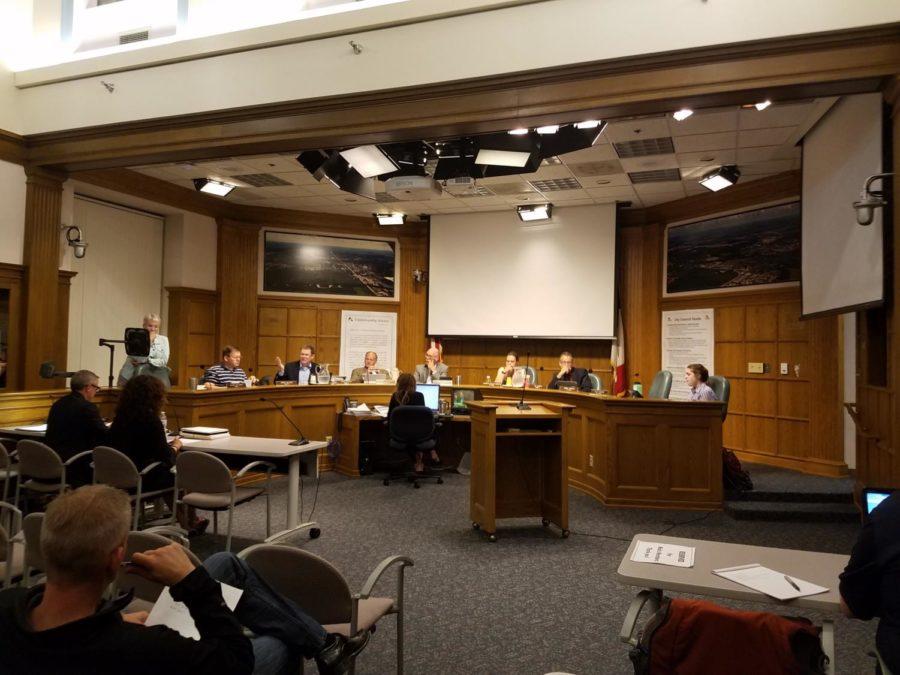- App Content
- App Content / News
- News
- News / Politics And Administration
- News / Politics And Administration / City
City council pushes back rental cap exemptions as council members raise concerns
City Council discusses Rental Cap exemptions at the June 26 City Council meeting. At-Large representative Amber Corrieri is not present but can speak and vote over the speaker system.
July 10, 2018
The Ames City Council pushed back their decision on exemptions for a rental cap proposal after concerns were raised by members on the council.
The Tuesday meeting discussed numerous public works projects and rental cap exemptions.
Ward One representative Gloria Betcher started the discussion on the cap exemptions saying she was concerned with the ambiguity behind one of the exemptions.
Under the current laws, Betcher said Letters of Compliance (LoC), the document needed to make a home a rental property, could be transferred with the sale of a home. This was an issue for some on the council, as it would undermine the idea of the rental cap and make it so properties with an LoC could pass it on indefinitely.
Ward Two representative Tim Gartin raised concerns that this change could be happening without public comment, a move he said would upset people.
“People would want to have input on this,” Gartin said. “The way this is coming in, I think some people’s feelings would be hurt.”
Betcher’s solution to this was originally to delay the second passage until the next City Council meeting, which will take place on July, 31.
Staff advised against this, as it would conflict with many of the deadlines built into the ordinance and would require many dates to be changed or the ordinance would “die.”
Ward Three representative David Martin gave a solution to this problem, proposing the council move the second passage into next week’s workshop.
Essentially, all of the amendments that City Council would take at the meeting would then be moved into the ordinance, but the second passage wouldn’t happen until the next week’s workshop.
The City Council approved this motion on a 4-2 vote.
Betcher had another suggestion for the ordinance to reduce the number of people taking advantage of the exemptions.
Under the proposed ordinance those who had gotten a building, electrical or plumbing permit in the past would be able to get an LoC if they finish the changes to make their home up to code within the next six months and then show proof of renting every year indefinitely.
Based on the staff report, which showed 52 properties would be able to receive an LoC under this exemption, Betcher said the time period used would allow too many people to get an LoC who never intended to get one.
“Fifty-two eligible properties,” Betcher said. “I don’t know how many of these 52 properties actually intended to get an LoC. I don’t see how 52 potentially new LoC’s doesn’t undermine the value of the cap.
“People could see this opportunity and seize it,” she said
Betcher’s alternative was to limit the number of properties who could get their LoC to be restricted to one year before the city stopped allowing new rental properties near campus.
Ward Four representative Chris Nelson said the council should help those impacted now and over time the cap would slowly accomplish its goals.
“Let’s help people with hardships now, and have [the cap] be a long term solution,” Nelson said.
Martin added his thoughts, saying the 52 properties would still have to go to great lengths to receive an LoC.
“It is use it or lose it,” Martin said. “If they don’t renew their LoC every year then they won’t be able to keep it.”
Betcher acknowledged this, but said she still thought it undermined the cap.
The motion to limit which years people had to have a building permit to be eligible for the exemption passed on a 4-2 vote.
The rental cap, which passed towards the end of May, limits the number of properties which can be rentals to 25 percent in neighborhoods near campus.
Before the cap passed, City Council placed a moratorium on all new rentals in those neighborhoods on October 27, 2017.
For more information on the full meeting agenda and additional information on the items discussed, click here.
















